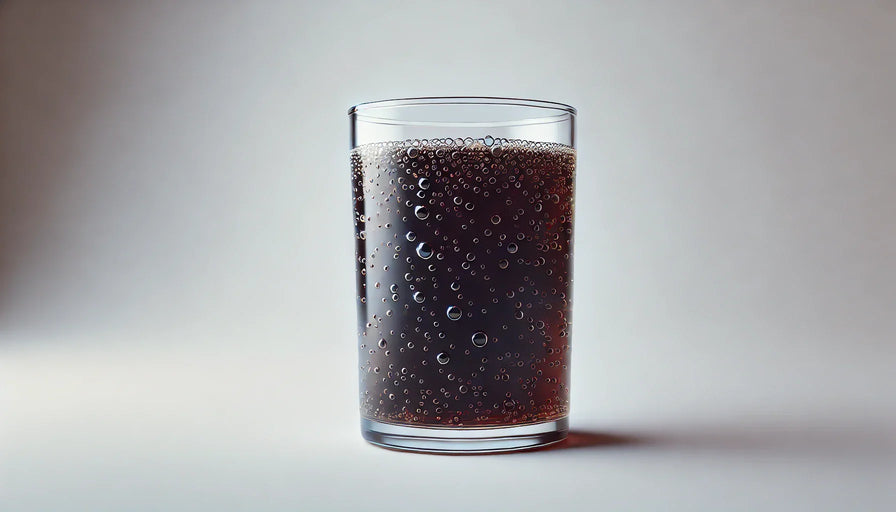
Does Carbonation Harden Your Ovaries?

Does carbonation harden your ovaries?
There is no scientific evidence to support the claim that carbonation hardens the ovaries. Carbonated beverages, consisting mainly of water, carbon dioxide, and various additives, do not directly affect the structure or function of the ovaries.
In today's health-conscious society, many individuals are increasingly interested in how different foods. With carbonation on the rise in popularity, people are particularly concerned on how carbonated beverages affect their bodies too.
A frequently asked question is whether certain drinks, especially carbonated beverages, might adversely affect reproductive health—despite the numerous studies highlighting the health benefits of carbonated water.
This blog aims to clarify the myths and misconceptions surrounding carbonation and ovarian function, illuminating the science behind these popular fizzy drinks and their actual impact on our health.
Table of contents

Where the false rumor began
The misconception that carbonation can harden ovaries may have originated from a viral incident involving a reality TV personality from Bravo.
During a candid conversation, she mentioned her struggles with health issues and jokingly attributed some of her discomfort to drinking too many carbonated beverages. This anecdote, taken out of context, quickly spread across social media platforms, leading to the unfounded belief that carbonation could directly affect ovarian health.
It's essential to clarify that while individual experiences can influence public perceptions, they do not replace scientific research and evidence.

Can soda affect fertility?
Research suggests that soda consumption may have potential implications for fertility, though results can vary based on multiple factors.
A study conducted at Boston University highlighted that women who consumed more than one sugary drink per day had a 25% lower chance of achieving pregnancy compared to those who consumed fewer than one sugary drink weekly.
Additionally, the study indicated a correlation between high soda intake and ovulatory disorders, with women who drank four or more sodas a week experiencing a 60% increased risk of ovulatory problems.
This is an ongoing topic of research, however, it is highly encouraged to discuss it with your healthcare provider for more personalized information.
Related read: Is Carbonation Bad for Your Bones?

Harmful ingredients in carbonated beverages
- High sugar levels
- Artificial sweeteners
- Phthalates
- Bisphenol A (BPA)
- PFAS ("forever chemicals")
- Sulfites
Many carbonated beverages contain harmful ingredients that could potentially negatively affect fertility. One of the primary concerns is the high sugar content found in regular sodas, which may lead to insulin resistance and obesity, both of which can impact hormonal balance and reproductive health.
Certain artificial sweeteners used in diet sodas have been associated with disruptions in gut bacteria and metabolic processes, potentially influencing fertility.
Additionally, phthalates and bisphenol A (BPA), which can be present in the packaging of these drinks, have been linked to endocrine disruption.
Another harmful ingredient typically found in many foods and beverages, but especially in carbonated beverages, is PFAS, or "forever chemicals." These chemicals have been linked to decreased sperm quality and potential negative impacts on female reproductive health.
These substances can interfere with hormonal function, possibly leading to fertility issues in both men and women. It is crucial for individuals trying to conceive to be mindful of not only what they consume but also the ingredients in their beverages, opting for healthier alternatives when possible.
Individuals have also found a rare reaction to sulfites found in certain carbonated beverages. This kind of allergic reaction is quite rare; however, it is often confused with being allergic to the CO2 in carbonation itself, which is not possible.
Reducing or eliminating the intake of sugary and artificially sweetened carbonated drinks can be a wise choice for enhancing overall health and fertility.
Related read: Is Soda Water Bad for You?

What are the potential effects of drinking soda regularly?
Regular consumption of soda, both sugary and artificially sweetened, can have negative effects on overall health and fertility.
Did you know the average soda bottle can contain just as much, if not more, sugar than a candy bar? That alone should be a wake-up call, as candy bars are generally considered a once-in-a-while treat. For me, it's a yearly treat specifically around the holidays!
The high sugar content in sodas can lead to weight gain and an increased risk of developing chronic diseases such as obesity, type 2 diabetes, and heart disease. These health issues can also contribute to infertility in both men and women.
If you’re diabetic, the good news is you’re not stuck with just plain water. There are plenty of tasty alternatives—think sparkling water, unsweetened teas, or even certain low-sugar juices.
Soda, on the other hand, can be rough on your health in more ways than one. Its high acid content wears down tooth enamel over time, which means cavities and, eventually, a higher risk of gum disease. Not exactly a fun trade-off for a fizzy drink.
And if you deal with IBS (irritable bowel syndrome), soda can make things even worse. Many of them are loaded with artificial sweeteners that don’t play nice with your digestive system, leading to extra pain and discomfort.
Summary
While carbonation itself does not harden the ovaries, the consumption of carbonated beverages, particularly those high in sugar and harmful ingredients, may have implications for reproductive and potentially kidney health.
Misconceptions stemming from anecdotal evidence can lead to confusion, highlighting the importance of relying on scientific research.
As studies indicate potential links between soda consumption and fertility issues, individuals are encouraged to consider healthier beverage options and consult healthcare providers for personalized advice on maintaining reproductive health.
Don't be afraid to substitute your daily water intake for sparkling water, though! Just make sure it's plain in flavor and free of PFAS.
Recommended reading

How to Give Back During Thanksgiving 2025
Key takeaways Thanksgiving is a time to express gratitude and share with those in need. From volunteering at local shelters to donating food and essentials, there are numerous ways to give back to...

What Does Carbonation Do to Your Body?
What does carbonation do to your body? Carbonation alone typically has minimal effects; however, it can cause bloating and discomfort for some, and it may worsen acid reflux due to carbon dioxide ...

What Are the Health Benefits of Sparkling Water?
Summary Sparkling water isn't just a refreshing drink—it comes with surprising health benefits too. From aiding digestion to improving hydration, discover how sparkling water can be a healthy addi...